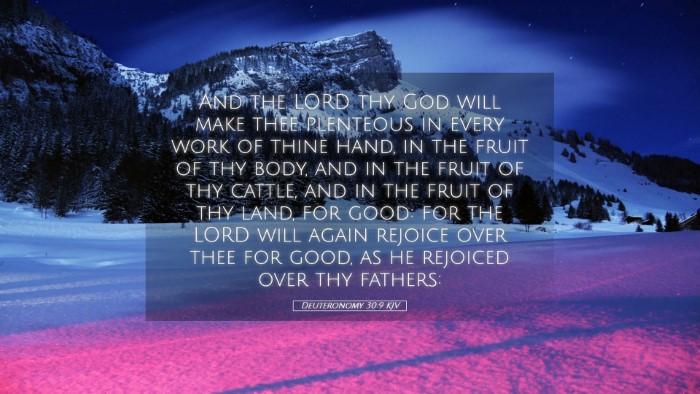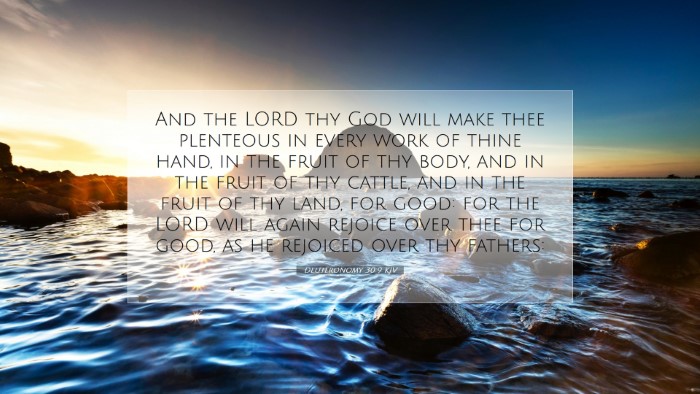Commentary on Deuteronomy 30:9
Bible Verse (Deuteronomy 30:9): "Then the Lord your God will make you abundantly prosperous in all the work of your hand, in the fruit of your womb, and in the fruit of your cattle and in the fruit of your ground. For the Lord will again take delight in prospering you, as he took delight in your fathers."
Introduction
Deuteronomy 30:9 serves as a profound declaration of God's promise of blessing and prosperity for His people, contingent upon their obedience and repentance. Within this verse lies an assurance that God delights in the welfare of His covenant people, promising both material and spiritual abundance.
Contextual Background
This verse comes at the culmination of Moses' address to the Israelites, who are poised to enter the Promised Land. It is a reminder of the covenant relationship between God and His people, emphasizing the necessity of commitment to the commandments and laws laid before them.
Historical Context
The Israelites had wandered in the wilderness for forty years due to disobedience and lack of faith. As Moses prepares to depart, he leads them in a final plea to embrace the blessings that come with covenant faithfulness.
Commentary Insights
Divine Prosperity
Matthew Henry notes that God's promise includes abundance in all aspects of life: "the work of your hand" encompasses vocational success, while "the fruit of your womb" highlights family blessings. It signifies that prosperity is holistic—impacting both personal and communal well-being.
God's Delight in Prosperity
Albert Barnes expounds on the phrase "the Lord will take delight." This suggests that God's pleasure is deeply intertwined with the prosperity of His people. God is not indifferent; rather, He actively desires to bless those who obey Him. The emphasis on God's joy reflects His relationship with humanity—He is not merely a sovereign ruler but a loving Father who takes pleasure in His children's well-being.
Fruitfulness and Its Significance
Adam Clarke articulates the significance of "fruit." In biblical terms, fruitfulness symbolizes vitality and health in various domains, including agriculture, family, and community life. The promise extends beyond mere economic success—it encompasses emotional and spiritual growth, making it a holistic blessing.
Theological Implications
- Covenantal Relationship: The blessings promised in Deuteronomy 30:9 are fundamentally linked to the obedience of the covenant. This reflects the larger biblical theme of reciprocity in relationships—God's blessings are often conditional upon human responsiveness.
- God’s Sovereignty and Care: The mention of God’s delight conveys His intimate involvement and sovereign control over the affairs of human lives. It reminds believers of the character of God as attentive and engaged in His people's lives.
- Holistic Salvation: The blessings extend to all areas of life, emphasizing that in God's kingdom, salvation includes every aspect of human experience—spiritual, emotional, and physical. This holistic perspective offers profound hope to believers facing distress in any area of their lives.
Application for Today’s Believers
As contemporary readers of this text, there are vital lessons pertinent to our spiritual journey:
- Obedience Brings Blessing: Just as the Israelites were called to obey God's commands, believers today are reminded that obedience to God’s Word leads to His blessings. This serves as a call to reflect on one's own life and the areas where God might be calling for greater obedience.
- Expectant Faith: The promise of God's delight in our prosperity encourages believers to trust in God's goodness and faithfulness. Faithfully waiting on God's provisions in times of need is an act of worship and reliance.
- Community and Family Focus: Recognizing that God's blessings encompass familial and community aspects encourages individuals to seek the welfare of those around them, cultivating an environment conducive to collective flourishing.
Conclusion
Deuteronomy 30:9 encapsulates the essence of God's character as a nurturing and benevolent deity who delights in the prosperity of His people. As we embrace this promise, it challenges us to remain steadfast in obedience, to seek holistic well-being, and to trust in God's great and abiding love for us. The call to reflect on this passage applies not only to individuals but to entire communities, encouraging a shared vision of spiritual and material abundance under God's faithful guidance.


